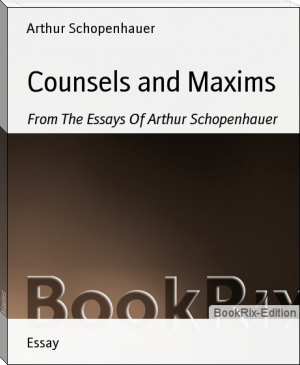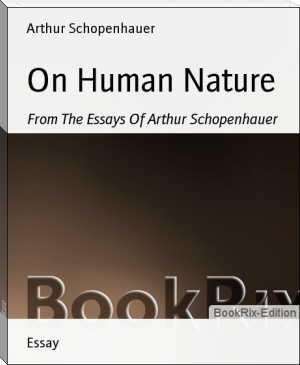Counsels and Maxims by Arthur Schopenhauer (ebooks children's books free .txt) 📕

Read free book «Counsels and Maxims by Arthur Schopenhauer (ebooks children's books free .txt) 📕» - read online or download for free at americanlibrarybooks.com
- Author: Arthur Schopenhauer
Read book online «Counsels and Maxims by Arthur Schopenhauer (ebooks children's books free .txt) 📕». Author - Arthur Schopenhauer
Le bonheur n'est pas chose aisée: il est
très difficile de le trouver en nous, et impossible
de le trouver ailleurs .
CHAMFORT.
CONTENTS.
CHAPTER
INTRODUCTION
I. GENERAL RULES
II. OUR RELATION TO OURSELVES
III. OUR RELATION TO OTHERS
IV. WORLDLY FORTUNE
V. THE AGES OF LIFE
INTRODUCTION.
If my object in these pages were to present a complete scheme of counsels and maxims for the guidance of life, I should have to repeat the numerous rules - some of them excellent - which have been drawn up by thinkers of all ages, from Theognis and Solomon[1] down to La Rochefoucauld; and, in so doing, I should inevitably entail upon the reader a vast amount of well-worn commonplace. But the fact is that in this work I make still less claim to exhaust my subject than in any other of my writings.
[Footnote 1: I refer to the proverbs and maxims ascribed, in the Old Testament, to the king of that name.]
An author who makes no claims to completeness must also, in a great measure, abandon any attempt at systematic arrangement. For his double loss in this respect, the reader may console himself by reflecting that a complete and systematic treatment of such a subject as the guidance of life could hardly fail to be a very wearisome business. I have simply put down those of my thoughts which appear to be worth communicating - thoughts which, as far as I know, have not been uttered, or, at any rate, not just in the same form, by any one else; so that my remarks may be taken as a supplement to what has been already achieved in the immense field.
However, by way of introducing some sort of order into the great variety of matters upon which advice will be given in the following pages, I shall distribute what I have to say under the following heads: (1) general rules; (2) our relation to ourselves; (3) our relation to others; and finally, (4) rules which concern our manner of life and our worldly circumstances. I shall conclude with some remarks on the changes which the various periods of life produce in us.
CHAPTER I.
GENERAL RULES. - SECTION 1.
The first and foremost rule for the wise conduct of life seems to me to be contained in a view to which Aristotle parenthetically refers in the Nichomachean Ethics :[1] [Greek: o phronimoz to alupon dioke e ou to aedu] or, as it may be rendered, not pleasure, but freedom from pain, is what the wise man will aim at .
[Footnote 1: vii. (12) 12.]
The truth of this remark turns upon the negative character of happiness, - the fact that pleasure is only the negation of pain, and that pain is the positive element in life. Though I have given a detailed proof of this proposition in my chief work,[1] I may supply one more illustration of it here, drawn from a circumstance of daily occurrence. Suppose that, with the exception of some sore or painful spot, we are physically in a sound and healthy condition: the sore of this one spot, will completely absorb our attention, causing us to lose the sense of general well-being, and destroying all our comfort in life. In the same way, when all our affairs but one turn out as we wish, the single instance in which our aims are frustrated is a constant trouble to us, even though it be something quite trivial. We think a great deal about it, and very little about those other and more important matters in which we have been successful. In both these cases what has met with resistance is the will ; in the one case, as it is objectified in the organism, in the other, as it presents itself in the struggle of life; and in both, it is plain that the satisfaction of the will consists in nothing else than that it meets with no resistance. It is, therefore, a satisfaction which is not directly felt; at most, we can become conscious of it only when we reflect upon our condition. But that which checks or arrests the will is something positive; it proclaims its own presence. All pleasure consists in merely removing this check - in other words, in freeing us from its action; and hence pleasure is a state which can never last very long.
[Footnote 1: Welt als Wille und Vorstellung . Vol. I., p. 58.]
This is the true basis of the above excellent rule quoted from Aristotle, which bids us direct our aim, not toward securing what is pleasurable and agreeable in life, but toward avoiding, as far as possible, its innumerable evils. If this were not the right course to take, that saying of Voltaire's, Happiness is but a dream and sorrow is real , would be as false as it is, in fact, true. A man who desires to make up the book of his life and determine where the balance of happiness lies, must put down in his accounts, not the pleasures which he has enjoyed, but the evils which he has escaped. That is the true method of eudaemonology; for all eudaemonology must begin by recognizing that its very name is a euphemism, and that to live happily only means to live less unhappily - to live a tolerable life. There is no doubt that life is given us, not to be enjoyed, but to be overcome - to be got over. There are numerous expressions illustrating this - such as degere vitam, vita defungi ; or in Italian, si scampa cosi ; or in German, man muss suchen durchzukommen; er wird schon durch die Welt kommen , and so on. In old age it is indeed a consolation to think that the work of life is over and done with. The happiest lot is not to have experienced the keenest delights or the greatest pleasures, but to have brought life to a close without any very great pain, bodily or mental. To measure the happiness of a life by its delights or pleasures, is to apply a false standard. For pleasures are and remain something negative; that they produce happiness is a delusion, cherished by envy to its own punishment. Pain is felt to be something positive, and hence its absence is the true standard of happiness. And if, over and above freedom from pain, there is also an absence of boredom, the essential conditions of earthly happiness are attained; for all else is chimerical.
It follows from this that a man should never try to purchase pleasure at the cost of pain, or even at the risk of incurring it; to do so is to pay what is positive and real, for what is negative and illusory; while there is a net profit in sacrificing pleasure for the sake of avoiding pain. In either case it is a matter of indifference whether the pain follows the pleasure or precedes it. While it is a complete inversion of the natural order to try and turn this scene of misery into a garden of pleasure, to aim at joy and pleasure rather than at the greatest possible freedom from pain - and yet how many do it! - there is some wisdom in taking a gloomy view, in looking upon the world as a kind of Hell, and in confining one's efforts to securing a little room that shall not be exposed to the fire. The fool rushes after the pleasures of life and finds himself their dupe; the wise man avoids its evils; and even if, notwithstanding his precautions, he falls into misfortunes, that is the fault of fate, not of his own folly. As far as he is successful in his endeavors, he cannot be said to have lived a life of illusion; for the evils which he shuns are very real. Even if he goes too far out of his way to avoid evils, and makes an unnecessary sacrifice of pleasure, he is, in reality, not the worse off for that; for all pleasures are chimerical, and to mourn for having lost any of them is a frivolous, and even ridiculous proceeding.
The failure to recognize this truth - a failure promoted by optimistic ideas - is the source of much unhappiness. In moments free from pain, our restless wishes present, as it were in a mirror, the image of a happiness that has no counterpart in reality, seducing us to follow it; in doing so we bring pain upon ourselves, and that is something undeniably real. Afterwards, we come to look with regret upon that lost state of painlessness; it is a paradise which we have gambled away; it is no longer with us, and we long in vain to undo what has been done.
One might well fancy that these visions of wishes fulfilled were the work of some evil spirit, conjured up in order to entice us away from that painless state which forms our highest happiness.
A careless youth may think that the world is meant to be enjoyed, as though it were the abode of some real or positive happiness, which only those fail to attain who are not clever enough to overcome the difficulties that lie in the way. This false notion takes a stronger hold on him when he comes to read poetry and romance, and to be deceived by outward show - the hypocrisy that characterizes the world from beginning to end; on which I shall have something to say presently. The result is that his life is the more or less deliberate pursuit of positive happiness; and happiness he takes to be equivalent to a series of definite pleasures. In seeking for these pleasures he encounters danger - a fact which should not be forgotten. He hunts for game that does not exist; and so he ends by suffering some very real and positive misfortune - pain, distress, sickness, loss, care, poverty, shame, and all the thousand ills of life. Too late he discovers the trick that has been played upon him.
But if the rule I have mentioned is observed, and a plan of life is adopted which proceeds by avoiding pain - in other words, by taking measures of precaution against want, sickness, and distress in all its forms, the aim is a real one, and something may be achieved which will be great in proportion as the plan is not disturbed by striving after the chimera of positive happiness. This agrees with the opinion expressed by Goethe in the Elective Affinities , and there put into the mouth of Mittler - the man who is always trying to make other people happy: To desire to get rid of an evil is a definite object, but to desire a better fortune than one has is blind folly . The same truth is contained in that fine French proverb: le mieux est l'ennemi du bien - leave well alone. And, as I have remarked in my chief work,[1] this is the leading thought underlying the philosophical system of the Cynics. For what was it led the Cynics to repudiate pleasure in every form, if it was not the fact that pain is, in a greater or less degree, always bound up with pleasure? To go out of the way of pain





Comments (0)